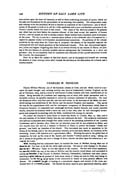
[p. 140]
CHARLES W. PENROSE
Charles William Penrose, one of the foremost citizens of Utah, and one whose name is a synonym for rapid thought and untiring activity, was born at Camberwell, London, England, on the 4th of February, 1832, and is a scion of well known Cornish families, who were stockholders of tin mines. Being naturally of a studious and inquiring turn of mind, with quick perception and remarkable memory, he speedily mastered at school the common rudiments of education. He read the Scriptures when only four yers old, and was well versed in the doctrines of the Bible, the wonderful sayings and predictions of the Savior, and the ancient Prophets and Apostles. This paved the way for his acquaintance with, and his subsequent acceptance of, Mormonism, which, from its Scriptural character, its reasonable and substantial doctrines, feasible theories, and sound practical results, attracted his attention while a mere lad, and, in due time, after he had thoroughly investigated and compared its teachings with the Bible, numbered him among its converts.
In the fall of 1883, in order to recuperate his energies, which were sorely taxed by overwork, he took a trip, in company with C. R. Savage, Esq., over the D. and R. G. Railway to Denver, thence through Colorado, south to New Mexico, Arizona and California, returning to Utah via the Central Pacific route. He now resumed his manifold duties. He had previously written a valuable work entitled "Mormon Doctrine." In the fall of 1884, he delivered several Sunday evening lectures in the Twelfth Ward Assembly Hall, answering anti-Mormon objections and charges against the faith and practice of the Latter-day Saints. Chief of these lectures were those on "Blood Atonement" and the Mountain Meadows Massacre," completely refuting the common stories in relation thereto. Both lectures were published at the Juvenile Instructor office. He continued to defend the "Mormon" cause politically and religiously, by press discussions as well as public speeches and private interviews with strangers. These vigorous labors excited the hostility of the anti-Mormon ring, and he was singled out, in the crusade under the Edmunds law, as a conspicuous target for their animosity. In the beginning of January, 1885, he was sent on a brief mission to the States, and during his absence his legal wife and family, down to a boy eight years old, were compelled to go before the grand jury. The wife refused to testify against her husband, but the evidence desired was extorted from the children.
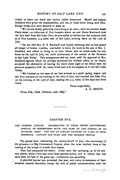
[p. 157]
CHAPTER XVII.
THE PIONEER JUBILEE. CELEBRATION OF THEIR TENTH ANNIVERSARY. ARRIVAL OF MESSENGERS WITH THE NEWS OF THE COMING OF AN INVADING ARMY. THE DAY OF JUBILEE CHANGED TO A DAY OF INDEPENDENCE. CAPTAIN VAN VLIET AND THE MORMON PEOPLE.
The people were celebrating the twenty-fourth of July—the anniversary of the pioneers—in Big Cottonwood Canyon, when the news reached them of the coming of the troops to invade their homes.
They had conquered the desert. Cities were fast springing up in the solitary places, where cities had never been planted before, and in valleys that had once been the bed of the great sea; civilization was spreading.
A plentiful harvest was promised that year, and every circumstance of their situation seemed favorable, except the lack of postal communication with the
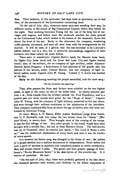
[p. 158]
East. Their isolation, in this particular, had kept them in ignorance, up to that time, of the movements of the Government concerning them.
On the 22d of July, 1857, numerous teams were seen wending their way, by different routes, to the mouth of Big Cottonwood Canyon, where they halted for the night. Next morning Governor Young led the van of the long line of carriages and wagons, and before noon the cavalcade reached the camp ground at the Cottonwood Lake, which nestles in the bosom of the mountain, 8,000 feet above the level of the sea. Early in the afternoon, the company, numbering 2,687 persons, encamped, and soon all were busy with the arrangements for the morrow. It will be seen, at a glance, that this was intended to be a pioneer's jubilee indeed; not in a city, but in primitive surroundings, suggestive of their entrance into these valleys ten years before.
"But before the sun had crimsoned the snowy peaks that surrounded the worshiping, rejoicing Saints, Brigham was in possession of the news, and the people were listening with breathless attention to the most stirring, important address that ever their leader had uttered, for upon his decision depended peace or war.
"Brigham was undaunted. With the inspiration of such surroundings—the grandeur of the Wasatch range of the Rocky Mountains everywhere encircling him, the stately trees whose foliage of a century's growth towered proudly to the heavens, the multitude of people before him who had listened to his counsels as if hearkening to the voice of the Most High—men and women who had followed him from the abodes of civilization to seek shelter in the wilderness from mobs, prattling innocents and youths who knew nothing of the world but Utah, and who looked to him as a father for protection—what could he not say?"
To say that the Mormons were taken with astonishment would be to misstate the case. They had long looked for this issue. They had seen mobs marshaled against them from the beginnimg, but they had also been told by their Prophet Joseph Smith, early in his career, that "Some day they would see the United States come against them in war, and that the Lord should deliver them and bring glory to His name." Nothing more unlikely could have been uttered by this prophet of a few hundred disciples; as likely was it that the stars of heaven should make war upon the earth in impotent wrath. They were not even in a location at that time where this was possible. The very prophecy foreshadowed their removal to the mountains, as though to invite the nation to the issue; and its fulfillment bespoke a destiny in them superior to the destiny even of the United States. The nation was now coming against them, to verify the prophecy in the most literal manner. Hence, doubtless, the extraordinary trust and fortitude of the people, and the self-possession of their leaders. They had no doubt as to the issue, though how God would work out their deliverance they saw not fully.
Everything the Mormons did at that time was done in the most deliberate earnestness. Two messengers were immediately dispatched to England, to call home the American Elders in Europe, and ten thousand British Saints would
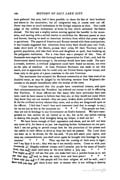
[p. 160]
have gathered that year, had it been possible, to share the fate of their brethren and sisters in the mountains; but all emigration was, of course now cut off. Never was there so much enthusiasm in the foreign missions as then. One could judge of the sublime enthusiasm at home by that which animated the Saints abroad. Yet they saw a mighty nation moving against the handful in the mountains, and moving with a settled resolve to annihilate the Mormon power at once and forever, leaving no seed on American territory from which that power might re-germinate. The papers of America and Europe teemed with these anticipations. It was broadly suggested that volunteers from every State should pour into Utah, make short work of the Saints, possess their cities, fill their Territory with a gentile population, and take their wives and daughters as spoil, thus breaking up the polygamic institution. For a time there was a prospect of this. Tens of thousands were eager for this thorough work of regeneration for Utah; and, had the Government dared to encourage it, the attempt would have been made. For such a crusade, however, a civilized judgement could have found no excuse, not even on the plea of rebellion. At least, President Buchanan was made to see this much, and to appreciate that he could only use United States regular troops, and these only in the guise of a posse comitates to the new Governor.
The sentiments that actuated the Mormon community at that time were of no doubtful tenor, as may be judged by the following extracts from Brigham's discourses to his people immediately after the receipt of the news.
"Liars have reported that this people have committed treason, and upon their misrepresentations the President has ordered out troops to aid in officering this Territory. If those officers are like many who have previously been sent here—and we have reason to believe that they are, or they would not come where they know they are not wanted—they are poor, broken down political hacks, not fit for the civilized society whence they came, and so they are dragooned upon us for officers. I feel that I won't bear such treatment (and that is enough to say,) for we are just as free as the mountain air. * * * This people are free; they are not in bondage to any Government on God's footstool. We have transgressed no law, neither do we intend so to do; but as for any nation coming to destroy this people, God Almighty being my helper, it shall not be! * *
* We have borne enough of their oppression and abuse, and we will not bear any more of it, for there is no just law requiring further forbearance on our part. And I am not going to permit troops here for the protection of the priests and the rabble in their efforts to drive us from the land we possess. The Lord does not want us to be driven, for He has said, ' If you will assert your rights, and keep my commandments, you shall never again be brought into bondage by your enemies' * * * They say that the coming of their army is legal; and I say that it is not; they who say it are morally rotten. Come on with your thousands of illegally-ordered troops, and I promise you in the name of Israel's God, that they shall melt away as the snow before a July sun. * * * You might as well tell me that you can make hell into a powder-house as to tell me that they intend to keep an army here and have peace! * * * I have told you that if this people will live their religion all will be well; and I bare told you that if not there is any man or woman who is not willing to destroy
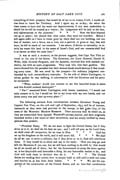
[p. 161]
everything of their property that would be of use to an enemy if left, I would advise them to leave the Territory. And I again say so to-day; for when the time comes to burn and lay waste our improvements, if any man undertakes to shield his he will be treated as a traitor; for 'judgement will be laid to the line, and righteousness to the plummet.' * * * Now the faint-hearted can go in peace; but should that time come, they must not interfere. Before I will again suffer as I have in times gone by there shall not one building, nor one foot of lumber, nor a fence, nor a tree, nor a particle of grass or hay, that will burn, be left in reach of our enemies. I am sworn, if driven to extremity, to utterly lay waste this land in the name of Israel's God, and our enemies shall find it as barren as when we came here."
It was at such a moment, as the picture suggests, that Capt. Van Vliet arrived in the city of the Saints. The Governor, the Lieut. General, Daniel H. Wells, Adjt. General Furguson, and the Apostles, received him with marked cordiality, but with an open programme, They took him into their gardens. The sisters showed him the paradise that their woman hands would destroy if that invading army came. He was awed by the prospect—his ordinary judgment confounded by such extraordinary examples. To the wife of Albert Carrington, in whose garden he was walking, in conversation with the Governor and his party he exclaimed:
"What, madam! would you consent to see this beautiful home in ashes and this fruitful orchard destroyed?"
"Yes!" answered Sister Carrington, with heroic resolution, "I would not only consent to it, but I would set fire to my home with my own hands, and cut down every tree and root up every plant!"
The following extracts from conversations between Governor Young and Captain Van Vliet, on the 12th and 13th of September, 1857, will be of interest, insomuch as they were had previous to the receipt, in Salt Lake City, of the news of the Mountain Meadow Massacre. Their accuracy may be relied on, as they are transcribed from Apostle Woodruff's private journal, and were originally recorded within a few hours of their occurrence, and are amply verified by many persons then present:
"President Young. We do not want to fight the United States, but if they drive us to it, we shall do the best we can; and I will tell you, as the Lord lives, we shall come off conquerers, for we trust in Him. * * * God has set up his kingdom on the earth, and it will never fall. * * * We shall do all we can to avert a collision, but if they drive us to it, God will overthrow them. If they would let us alone and say to the mobs: 'Now you may go and kill the Mormons if you can, but we will have nothing to do with it,' that would be all we would ask of them; but for the Government to array the army against us, is too despicable and damnable a thing for any honorable nation to do, and God will hold them in derision who do it. * * * The United States are sending their armies here to simply hold us still until a mob can come and butcher us, as has been done before. * * * We are the supporters of the constitution of the United States, and we love that constitution
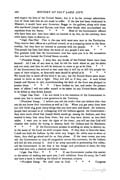
[p. 162]
and respect the laws of the United States; but it is by the corrupt administration of those laws that we are made to suffer. If the law had been vindicated in Missouri, it would have sent Governor Boggs to the gallows, along with those who murdered Joseph and Hyrum, and those other fiends who accomplised our expulsion from the States. * * * Most of the Government officers who have been sent here have taken no interest in us, but, on the contrary, have tried many times to destroy us.
"Capt. Van Vliet This is the case with most men sent to the Territories. They receive their offices as a political reward, or as a stepping-stone to the Senatorship; but they have no interest in common with the people. * * * This people has been lied about the worst of any people I ever saw. * * The greatest hold that the Government now has upon you is in the accusation that you have burned the United States records.
"President Young. I deny that any books of the United States have been burned! All I ask of any man is, that he tell the truth about us, pay his debts and not steal, and then he will be welcome to come or go as he likes. * * If the Government has arrived at that state that it will try to kill this people because of their religion, no honorable man shoald be afraid of it. * * * We would like to ward off this blow if we can; but the United States seem determined to drive us into a fight. They will kill us if they can. A mob killed Joseph and Hyrum in jail, notwithstanding the faith of the State was pledged to protect them. * * * I have broken no law, and under the present state of affairs I will not suffer myself to be taken by any United States officeri to be killed as they killed Joseph.
"Capt. Van Vliet: I do not think it is the intention of the Government to arrest you, but to install a new governor in the Territory.
"President Young: I believe you tell the truth—that you believe this—but you do not know their intentions as well as I do. When you get away from here you will think off great many things that you have seen and heard: for instance, people have accused us of colleaguing with the Indians against the Government: they were much afraid that Joseph Smith would go among the Indians, and they wanted to keep him away from them; but now they have driven us into their midst. I want you to note the signs of the times; you will see that God will chastise this nation for trying to destroy both the Indians and the Mormons. * * * If the Government persists in sending an army to destroy us, in the name of the Lord we shall conquer them. If they dare to force the issue, I shall not hold the Indians by the wrist any longer, for white men to shoot at them; they shall go ahead and do as they please. If the issue comes, you may tell the Government to stop all emigration across this continent, for the Indians will kill all who attempt it. And if an army suceceds in penetrating this valley, tell the Government to see that it has forage and provisions in store, for they will find here only a charred and barren waste.
"Capt. Van Vliet: * * * If our Government pushes this matter to the extent of making war upon you, I will withdraw from the army, for I will not have a hand in shedding the blood of American citizens.
"President Young: We shall trust in God. * * * Congress
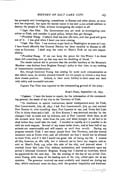
[p. 163]
has promptly sent investigating committees to Kansas and other places, as occasion has required; but upon the merest rumor it has sent 2,000 armed soldiers to destroy the people of Utah, without investigating the subject at all.
"Capt. Van Vliet. The Government may yet send an investigating committee to Utah, and consider it good policy, before they get through.
"President Young. I believe God has sent you here, and that good will grow out of it. I was glad when I heart you were coming.
"Capt. Van Vliet. I am anxious to get back to Washington as soon as I can. I have heard officially that General Harney has been recalled to Kansas to officiate as Governor. I shall stop the train on Ham's Fork on my own responsibility.
"President Young. If we can keep the peace for this Winter I do think there will something turn up that may save the shedding of blood."
The reader cannot fail to perceive that the terrible butchery at the Mountain Meadow—was farthest from Brigham Young's policy at that time, to say nothing of humanitarian considerations.
But, though Governor Young was aiming for some such consummation as that which came, he neither allowed himself nor his people to retreat a step from their chosen position. Indeed, in their stern fidelity to their cause was their only safety and successful outcome.
Captain Van Vliet thus reported to the commanding general of the army:
Ham's Fork, September 16, 1857.
"Captain: I have the honor to report, for the information of the commanding general, the result of my trip to the Territory of Utah.
"In obedience to special instructions, dated headquarters army for Utah, Fort Leavenworth, July 28, 1857, I left Fort Leavenworth, July 30, and reached Fort Kearny in nine travelling days, Fort Laramie in ten, and Great Salt Lake City in thirty-three and a half. At Fort Kearny I was detained one day by the changes I had to make and by sickness, and at Fort Laramie three days, as all the animals were forty miles from the post, and when brought in all had to be shod before they could take the road. I traveled as rapidly as it is possible to do with six mule wagons. Several of my teams broke down, and at least half of my animals are unserviceable and will remain so until they recruit. During my progress towards Utah I met many people from that Territory, and also several mountain men at Green river, and all informed me that I would not be allowed to enter Utah, and if I did I would run great risk of losing my life. I treated all this, however, as idle talk, but it induced me to leave my wagons and escort at Ham's Fork, 143 miles this side of the city, and proceed alone. I reached Great Salt Lake City without molestation, and immediately upon my arrival I informed Governor Brigham Young that I desired an interview, which he appointed for the next day. On the evening of the day of my arrival Governor Young, with many of the leading men of the city, called upon me at my quarters. The governor received me most cordially and treated me during my stay, which continued some six days, with the greatest hospitality and kindness.
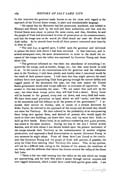
[p. 164]
In this interview the governor made known to me his views with regard to the approach of the United States troops, in plain and unmistakeable language.
"He stated that the Mormons had ben persecuted, murdered, and robbed in Missouri and Illinois both by the mob and State authorities, and that now the United States were about to pursue the same course, and that, therefore, he and the people of Utah had determined to resist all persecution at the commencement, and that the troops now on the march for Utah should not enter the Great Salt Lake valley. As he uttered these words all those present concurred most heartily in what he said.
"The next day, as agreed upon, I called upon the governor and delivered in person the letter with which I had been entrusted. In that interview, and in several subsequent ones, the same determination to resist to the death the entrance of the troops into the valley was expressed by Governor Young and those about him.
"The governor informed me that there was abundance of everything I required for the troops, such as lumber, forage, etc., but that none would be sold to us. In the course of my conversations with the governor and the influential men in the Territory, I told them plainly and frankly what I conceived would be the result of their present course. I told them that they might prevent the small military force now approaching Utah from getting through the narrow defiles and rugged passes of the mountains this year, but that next season the United States government would send troops sufficient to overcome all opposition. The answer to this was invariably the same: "We are aware that such will be the case; but when those troops arrive they will find Utah a desert. Every house will be burned to the ground, every tree cut down, and every field laid waste. We have three years' provisions on hand, which we will 'cache,' and then take to the mountains and bid defiance to all the powers of the government." I attended their service on Sunday, and, in course of a sermon delivered by Elder Taylor, he referred to the approach of the troops and declared they should not enter the Territory. He then referred to the probability of an overpowering force being sent against them, and desired all present, who would apply the torch to their own buildings, cut down their trees, and lay waste their fields, to hold up their hands. Every hand, in an audience numbering over 4,000 persons, was raised at the same moment. During my stay in the city I visited several families, and all with whom I was thrown looked upon the present movement of the troops towards their Territory as the commencement of another religious persecution, and expressed a fixed determination to sustain Governor Young in any measures he might adopt. From all these facts I am forced to the conclusion that Governor Young and the people of Utah will prevent, if possible, the army for Utah from entering their Territory this season. This, in my opinion, will not be a difficult task, owing to the lateness of tiie season, the smallness of our force, and the defences that nature has thrown around the valley of the Great Salt Lake.
"There is but one road running into the valley on the side which our troops are approaching, and for over fifty miles it passes through narrow canyons and over rugged mountains, which a small force could hold against great odds. I am
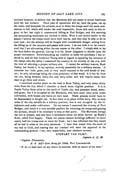
[p. 165]
inclined however, to believe that the Mormons will not resort to actual hostilities until the last moment. Their plan of operations will be, burn the grass, cut up the roads, and stampede the animals, so as to delay the troops until the snow commences to fall, which will render the road impassable. Snow falls early in this region, in fact last night it commenced falling at Fort Bridger, and this morning the surrounding mountains are clothed in white. Were it one month earlier in the season I believe the troops could force their way in, and they may be able to do so even now; but the attempt will be fraught with considerable danger, arising from the filling up of the canyons and passes with snow. I do not wish it to be considered that I am advocating either the one course or the other. I simply wish to lay the facts before the general, leaving it to his better judgment to decide upon the proper movements. Notwithstanding my inability to make the purchases I was ordered to, and all that Governor Young said in regard to opposing the entrance of the troops into the valley I examined the country in the vicinity of the city, with the view of selecting a proper military site. I visited the military reserve, Rush Valley, but found it, in my opinion, entirely unsuitable for a military station. It contains but little grass, and is very much exposed to the cold winds of winter; its only advantage being the close proximity of fine wood. It is too far from the city, being between thirty-five and forty miles, and will require teams four days to go there and return.
I examined another point on the road to Rush Valley, and only about thirty miles from the city, which I consider a much more eligible position. It is in Tuelle Valley three miles to the north of Tuelle city, and possesses wood, water, and grass; but it is occupied by the Mormons, who have some sixty acres under cultivation, with houses and barns on their land. These persons would have to be dispossessed or bought out. In fact there is no place within forty, fifty or sixty miles of the city suitable for a military position, that is not occupied by the inhabitants and under cultivation. On my return I examined the vicinity of Fort Bridger, and found it a very suitable position for wintering the troops and grazing the animals, should it be necessary to stop at that point. The Mormons occupy the fort at present, and also have a settlement about ten miles further up Black's Fork, called Fort Supply. These two places contain buildings sufficient to cover nearly half the troops now en route for Utah; but I was informed that they would all be laid in ashes as the army advances. I have thus stated fully the result of my visit to Utah, and trusting that my conduct will meet the approval of the commanding general, I am, very respectfully, your obedient servant,
STEWART VAN VLIET,
Captain A. Q. M.
"Captain Pleasanton,
A. A. Adft Gen. Army for Utah, Fort Leavenworth.
"P. S.—I shall start on my return to-morrow, with an escort of ten men."
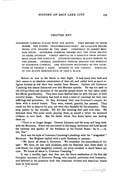
[p. 225]
CHAPTER XXV.
GOVERNOR GUMMING PLEADS WITH THE SAINTS. THEY RETURN TO THEIR HOMES. THE JUDGES. CRADLEBAUGHS COURT. HE CALLS FOR TROOPS. PROVO CITY INVADED BY THE ARMY. CONSPIRACY TO ARREST BRIGHAM YOUNG. GOVERNOR CUMMING ORDERS OUT THE UTAH MILITIA TO REPEL INVASION. TIMELY ARRIVAL OF A DISPATCH FROM GOVERNMENT STAYS THE CONFLICT. ATTORNEY-GENERAL BLACK'S REBUKE TO THE JUDGES. GENERAL JOHNSTONS FRIENDS DEMAND THE REMOVAL OF GOVERNOR CUMMING. THE SITUATION RECOVERED BY THE PATRIOTISM OF THOMAS L. KANE. DIVISION IN THE CABINET. PARALLEL OF THE BLAINE REMINISCENCE OF JERE S. BLACK.
Return we now to the Saints in their flight. It had taxed their faith and their means to an absolute consecration of their all, and called forth as much religious heroism as did their first exodus from Nauvoo. Gallant old Governor Cumming was almost distracted over this Mormon episode. He was not used to the self-sacrifices and devotion of the peculiar people whom he had taken under his official guardianship. They were more familiar than he with this part of their eventful drama. Familiarity had bred in them a kind of contempt for their own sufferings and privations. So they witnessed their new Governor's concern for them with a stoical humor. They were, indeed, grateful, but amused. They could not feel to deserve his pity, yet were they thankful for his sympathy. They sang psalms by the wayside. He felt like strewing their path with tears. He followed them fifty miles south, praying them, as would a father his wayward children, to turn back. But the father whom they knew better was leading them on.
"There is no longer danger. General Johnston and the army will keep faith with the Mormons. Every one concerned in this happy settlement will hold sacred the amnesty and pardon of the President of the United States! By G—d, sirs, Yes."
Such was the style of Governor Cumming's pleadings with the "misguided" Mormons. But Brigham replied with a quiet fixedness of purpose:
"We know all about it, Governor. We remember the martyrdoms of the past! We have, on just such occasions, seen our disarmed men hewn down in cold blood, our virgin daughters violated, our wives ravished to death before our eyes. We know all about it, Governor Gumming."
It was a terrible logic that thus met the brave meditation of the fine old Georgian successor of Governor Young, who coupled patriotism with humanity, and believed in the primitive faith that American citizens and American homes must be held sacred.
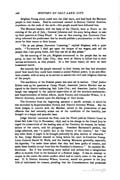
[p. 226]
Brigham Young alone could turn the tidal wave, and lead back the Mormon people to their homes. Had he continued onward to Sonora, Central America, anywhere—to the ends of the earth—this people would have followed him.
The Mormon leaders, with the body of the Church, were at Provo on the evening of the 4th of July; General Johnston and his army being about to take up their quarters at Camp Floyd. It was on that evening that Governor Cumming informed his predecessor that he should publish a proclamation to the Mormons for their return to their homes.
"Do as you please, Governor Cumming," replied Brigham, with a quiet smile. "To-morrow I shall get upon the tongue of my wagon, and tell the people that I am going home, and they can do as they please."
On the morning of the 5th, Brigham announced to the people that he was going to start for Salt Lake City; they were at liberty to follow him to their various settlements, as they pleased. In a few hours nearly all were on their homeward march.
But scarcely had the people returned to their homes, ere they had abundant proof how much they could have trusted a united Federal power, in an anti-Mormon crusade, with an army at its service to subvert the civil and religious liberties of the people.
The machinery of the Federal power was soon set in motion. Chief Justice Eckles took up his quarters at Camp Floyd; Associate Justice Sinclair was assigned to the district embracing Salt Lake City; and Associate Justice Cradlebaugh was assigned to the judicial supervision of all the southern settlements; and Superintendent of Indian Affairs, Jacob Forney, and Alexander Wilson, U. S. District Attorney, entered upon the discharge of their duties.
The Governor from the beginning assumed a pacific attitude, in which he was seconded by Superintendent Forney and District-Attorney Wilson. But the three Judges, in concert with the Marshal, united in the prosecution of past offences that had naturally arisen out of the condition of the hostility, just brought to a happy and peaceful issue.
Judge Sinclair convened the First, now the Third Judicial District Court in Great Salt Lake City in November, 1858, and in his charge to the Grand Jury he urged the prosecution of the leading men of the Territory for treason, for intimidation of the courts, and for polygamy. President Buchanan's pardon, the Judge admitted, was "a public fact in the history of the country," but "like any other deed, it ought to be brought judicially by plea, motion or otherwise." In fine, Judge Sinclair wanted to bring before his court ex-Governor Young, Lieut.-General Daniel H. Wells, and the leading Mormons generally, especially the Apostles, "to make them admit that they had been guilty of treason, and make them humbly accept from him the President's clemency." So explains Mr. Stenhouse. But it was something more radical and serious than a vainglorious effort to humble Utah to the footstool of a Federal Judge. It was an attempt to reopen in the courts the entire conflict which had so nearly come to the issue of war. U. S. District Attorney Wilson, however, would not present to the jury bills of indictment for treason, pleading that the Commissioners had presented
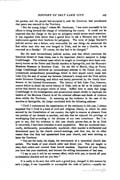
[p. 227]
the pardon, and the people had accepted it, and the Governor had proclaimed that peace was restored to the Territory.
"But the young Judge," relates Mr. Stenhouse, "was more successful in his efforts to bring forward the charge of intimidating the courts. It could not be expected that the charge to the jury on polygamy would secure much attention. It was regarded little better than a grand farce to ask a Mormon jury to find indictments against their brethren for polygamy. The term of Judge Sinclair's judicial service was a failure, only memorable for one thing—he sentenced the first white man who was ever hanged in Utah, and he was a Gentile, to be executed on a Sunday! Of course, the day had to be changed."
But the most extraordinary judicial action, and that which continues the historical thread of those times, was in the important district assigned to Judge Cradlebaugh. The criminal cases which he sought to investigate were those commonly known as the Potter and Parrish murders at Springville, and the Mountain Meadows Massacre in Southern Utah. On the 8th of March, 1859, at Provo, Judge Cradlebaugh delivered an extraordinary address to the Grand Jury, and commenced extraordinary proceedings, which in their sequel nearly made Salt Lake City the seat of actual war between Johnston's troops and the Utah militia under Governor Cumming, and which was barely prevented by the timely interference of the General Government. The history of Salt Lake City, however, cannot follow in detail the entire history of Utah, only so far as its subject and action find therein its proper centre of unity. Suffice here to mark that Judge Cradlebaugh in his investigations and prosecutions aimed chiefly to implicate the leaders of the Mormon Church in all the criminal offenses and deeds of violence done within the Territory. In summing up the evidence in the case of the murders at Springville, the judge concluded with the following address:
"Until I commenced the examination of the testimony in this case, I always supposed that I lived in a land of civil and religious liberty, in which we were secured by the Constitution of our country the right to remove at pleasure from one portion of our domain to another, and also that we enjoyed the privilege of worshipping God according to the dictates of our own conscience. But I regret to say, that the evidence in this case clearly proves that, so far as Utah is concerned, I have been mistaken in such supposition. Men are murdered here: coolly, deliberately, premediatatedly murdered—their murder is deliberated and determined upon by the church council-meetings, and that, too, for no other reason than that they had apostatised from your church, and were striving to leave the Territory.
"You are the tools, the dupes, the instruments of a tyrannical church despotism. The heads of your church order and direct you. You are taught to obey their orders and commit these horrid murders. Deprived of your liberty you have lost your manhood, and become the willing instruments of bad men.
"I say to you it will be my earnest effort, while with you, to knock off your ecclesiastical shackles and set you free."
It is easily to be seen that with such a grand jury, charged in this manner by such a judge, it was impossible to accomplish the ends of justice;—equally im-
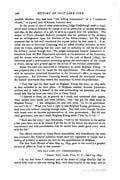
[p. 228]
possible whether they had been "the willing instruments" of a "tyrannical church," or a grand jury of honest, innocent men.
In the course of one of these prosecutions, Judge Cradlebaugh made a requisition upon General Johnston for troops to act as protection to certain witnesses, and also, in the absence of a jail, to serve as a guard over the prisoners. The mayor of Provo (Kimball Bullock) protested that the presence of the military was an infringement upon the liberties of his fellow-citizens; but the judge answered that he had well considered the request before he had made it. A petition was sent to Governor Cumming, and he asked General Johnston to withdraw the troops, asserting that the court had no authority to call for the aid of the military, except through him. The judges interpreted General Johnston's instructions from the War Department adversely to the statement of the Governor, and the troops were continued at Provo. On the 27th of March (1859), the Governor issued a proclamation protesting against the continuance of the troops at Provo, taking open ground against the action of the military commander.
About this time was concocted a conspiracy to arrest Brigham Young. It was proposed that a writ be issued for his apprehension. The officers entrusted with its execution presented themselves at the Governor's office, to request his co-operation. But Governor Cumming stoutly resisted the attempted outrage. He himself afterwards thus related this conspiracy to arrest his predecessor:
"They had 'got the dead wood on Brigham Young this time,' so they said, as they unfolded to me their plans. If Brigham resisted, General Johnston's artillery was to make a breach in the wall surrounding his premises, and they would take him by force and carry him to Camp Floyd.
"I listened to them, sir, as gravely as I could, and examined their papers. They rubbed their hands and were jubilant; they 'had got the dead wood on Brigham Young!' I was indignant, sir, and told them, 'by G—d, gentlemen, you can't do it! When you have a right to take Brigham Young, gentlemen, you shall have him without creeping through walls. You shall enter through his door with heads erect as become representatives of your government. But till that time, gentlemen, you can't touch Brigham Young while I live, by G—d!'"
"Such was the story," says Stenhouse, "told by the Governor to the author a few years later, and as he related it all the fire of his nature was depicted on his countenance and told unmistakably that he would have made good every word with his life."
The officers returned to Camp Floyd discomfited, and immediately the news was circulated that General Johnston would send two regiments of troops and a battery of artillery to enforce the writ for the apprehension of Brigham.
The New York Herald of date May 25, 1859, gave to the country a graphic picture of affairs in Utah at that moment:
our salt lake city correspondence.
"Great Salt Lake City, U. T., April 23, 1859.
"In my last letter I informed you of the threat of Judge Sinclair that he would hold court in this city during May, with three-fourths of the army now at
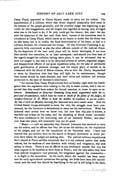
[p. 229]
Camp Floyd, quartered in Union Square, ready to carry out his orders. The apprehension of a collision which that threat inspired measurably died away in the bosoms of the people generally, and the youthful judge was beginning to get credit for idle braggadocia, and his tongue was regarded as having only divulged what was in his heart to do, if he only could get the chance; but, alas! the day after the departure of the last mail from here, rumors of his intentions were in circulation at Camp Floyd, which leaves us no reason to doubt that his threat was no idle boast, but is in reality the fixed determination of his heart, to lead to a collision between the citizens and the troops. Of this Governor Cumming is apparently fully convinced, as also the other officials outside of the judicial clique. By the departure of the next mail, plans will be better developed, if not even then carried into execution, or at least attempted; and should you then hear of the eagerly-sought-for collision having taken place, it can be witnessed that we have not sought it, but that it is the deep-laid scheme of sutlers, degraded judges, and disappointed officers of our great republican army, for the sake of perishable gold, gratification of personal revenge, and the empty glory of swords to be crimsoned with the blood of fellow-citizens, who so love the liberty bequeathed to them by illustrious sires that they will fight for its maintenance, though their homes should be made desolate and their wives and children left without protectors in the land of freemen's inheritance.
"An express from Camp Floyd arrived here on Sunday night with the intelligence that two regiments were coming to the city to make arrests, and it was expected that they would have orders for forced marches, to come in upon us unawares. Immediately on Governor Cumming being made acquainted with the report and circumstances, which leave no room to doubt of the plans of the judges, he notified General D. H. Wells to hold the militia in readiness to act on orders. By two o'clock on Monday morning five thousand men were under arms. Had the United States' troops attempted to enter the city, the struggle must have commenced, for the Governor is determined to carry out his instructions. What has deferred their arrival here we know not; but now that this plan is known, a watchful eye is kept on the camp, and the shedding of blood seems inevitable. We have confidence in the overruling care of our heavenly Father; and what ever does take place, will eventually turn out for good.
"Major — told me yesterday that General Johnston was resolved to carry out his orders, and he affirms that they are to use the military on the requisition of the judges, and not on the requisition of the Governor only. I have just learned that 500 soldiers were on the march to Sanpete settlement to arrest persons there whom the judges are seeking after. The judicial-military-inquisitorial farce played at Provo satisfies everybody that it is not violated justice that seeks redress, but the madness of men drunken with whisky and vengeance, that seek satiety in blood. There is not an official in any settlement outside this city but what expects to be handled as were those at Provo; and the only safety they have from judicial vengeance—not personal, but vengeance against the community—is in flight to the mountains. In the south, where the weather has been excellent for early agricultural operations this spring, the fields have been left uncultivated, and the seed that should be fructifying in the soil is still lying in the barn,
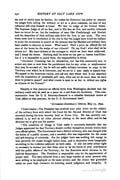
[p. 230]
the end of which must be famine; for unless the Governor has power to restrain the judges from calling the military to act as a posse comitates, no man of any influence will trust himself at home. We fear no judge of the United States. The Supreme Judge of all we fear, and in His fear we live, and earthly tribunals have no terror for us: but the insolence of men like Cradlebaugh and Sinclair and the despotism of their military aids drive the iron to our souls. The very latest news now in circulation in the city is that the judges have hired the Indians to scour the mountains in search of the persons that the Marshal and military have been unable to discover at home. What next? Shall a price be offered the red men of the forest for the scalps of our citizens? Oh, my God! what shall we be driven to? My heart sickens at the outrages to which we have been subjected, and I dread the future. Nothing shall be done on our part to hasten hostilities; but if it is impossible to avoid them, the responsibility is theirs.
"Governor Cumming has no disposition, nor has this community any, to screen any man or men from the punishment due for any crime or misdemeanor they may be accused of; but he will not suffer military terrorism to reign in the Territory over which he is Governor, and we are to a man ready to sustain him. We appeal to the American nation, and ask any man whose soul is not absorbed with the acquisition of perishable pelf only, what can we do more than we have done to preserve peace? and what course is open to us but to defend our rights as citizens of the Union?"
Happily at this juncture an official letter from Washington decided that the military could only be used as a posse on a call from the Governor. This communication from the U. S. Attorney-General is a valuable historical review of Utah affairs at that juncture, by the U. S. Government itself:
"Attorney-General's Office, May 17, 1859.
"Gentlemen—The President has received your joint letter on the subject of the military force with which the Court for the Second District of Utah was attended during the term recently held at Provo City. He has carefully considered it, as well as all other advices relating to the same affair, and he has directed me to give you his answer.
"The condition of things in Utah made it extremely desirable that the Judges appointed for that Territory should confine themselves strictly within their own official sphere. The Government had a district attorney, who was charged with the duties of a public accuser, and a marshal, who was responsible for the arrest and safe-keeping of criminals. For the judges there was nothing left except to hear patiently the causes brought before them, and to determine them impartially according to the evidence adduced on both sides. It did not seem either right or necessary to instruct you that these were to be the limits of your interference with the public affairs of the Territory; for the Executive never dictates to the Judicial department. The President is responsible only for the appointment of proper men. You were selected from a very large number of other persons who were willing to be employed on the same service, and the choice was grounded solely on your high character for learning, sound judgment, and integrity. It
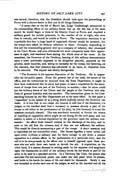
[p. 231]
was natural, therefore, that the President should look upon the proceedings at Provo with a sincere desire to find you in all things blameless.
"It seems that on the 6th of March last, Judge Cradlebaugh announced to the commanding officer of the military forces that on the 8th day of the same month he would begin a term of the District Court at Provo, and required a military guard for certain prisoners, to the number of six or eight, who were then in custody, and would be triable at Provo. The requisition mentions it as a probable fact that 'a large band of organized thieves' would be arrested; but the troops were asked for without reference to them. Promptly responding to this call the commanding-general sent up a company of infantry, who encamped at the Court House, and soon afterwards ten more companies made their appearance in sight, and remained there during the whole term of the court. In the meantime, the Governor of the Territory, hearing of this military demonstration upon a town previously supposed to be altogether peaceful, appeared on the ground, made inquiries, and, seeing no necessity for the troops, but believing, on the contrary, that their presence was calculated to do harm, he requested them to be removed. The request was wholly disregarded.
"The Governor is the supreme Executive of the Territory. He is responsible for the public peace. From the general law of the land, the nature of his office, and the instructions he received from the State Department, it ought to have been understood that he alone had power to issue a requisition for the movement of troops from one part of the Territory to another,—that he alone could put the military forces of the Union and the people of the Territory into relations of general hostility with one another. The instructions given to the Commanding-General by the War Department are to the same effect. In that paper a 'requisition' is not spoken of as a thing which anybody except the Governor can make. It is true that in one clause the General is told that if the Governor, the judges, or the marshal shall find it necessary to summon directly a part of the troops to aid either in the performance of his duty, he (the General) is to see the summons promptly obeyed. This was manifestly intended to furnish the means of repelling an opposition which might be too strong for the civil posse, and too sudden to admit of a formal requisition by the governor upon the military commander. An officer finds himself resisted in the discharge of his duty, and he calls to his aid first the citizens, and, if they are not sufficient, the soldiers. This would be directly summoning a part of the troops. A direct summons and a requisition are not convertible terms. The former signifies a mere verbal call upon either civilians or military men for force enough to put down a present opposition to a certain officer in the performance of a particular duty; and the call is to be always made by the officer who is himself opposed upon those persons who are with their own hands to furnish the aid. A requisition, on the other hand, is a solemn demand in writing made by the supreme civil magistrate upon the commander-in-chief of the military forces for the whole or part of the army to be used in a specified service. In a Territory like Utah, the person who exercises this last-mentioned power can make war and peace when he pleases, and holds in his hands the issues of life and death for thousands. Surely it was not intended to clothe each one of the judges, as well as the marshal and all his
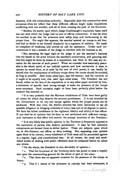
[p. 232]
deputies, with this tremendous authority. Especially does this construction seem erroneous when we reflect that these different officers might make requisitions conflicting with one another, and all of them crossing the path of the Governor.
"Besides, the matter upon which Judge Cradlebaugh's requisition bases itself was one with which the Judge had no sort of official connection. It was the duty the marshal to see that the prisoners were safely kept and forthcoming at the proper time. For aught that appears, the marshal wanted no troops to aid him, and had no desire to see himself displaced by a regiment of soldiers. He made no complaint of weakness, and uttered no call for assistance. Under such circumstances it was a mistake of the Judge to interfere with the business at all.
"But, assuming the legal right of the judge to put the marshal's business into the hands of the army without the marshal's concurrence, and granting also that this might be done by means of a requisition, was there in this case any occasion for the exercise of such power? When we consider how essentially peaceable is the whole spirit of our judicial system, and how exclusively it aims to operate by moral force, or at most by the arm of civil power, it can hardly be denied that the employment of military troops about the courts should be avoided, as long as possible. Inter arma silent leges, says the maxim; and the converse of it ought to be equally true, that inter leges silent arma. The President has not found, either on the face of the requisition or in any other paper received by him, a statement of specific facts strong enough to make the presence of the troops seem necessary. Such necessity ought to have been perfectly plain before the measure was resorted to.
"It is very probable that the Mormon inhabitants of Utah have been guilty of crimes for which they deserve the severest punishment. It is not intended by the Government to let any one escape against whom the proper proofs can be produced. With that view, the district attorney has been instructed to use all possible diligence in bringing criminals of every class and of all degrees to justice. We have the fullest confidence in the vigilance, fidelity and ability of that officer. If you shall be of opinion that his duty is not performed with sufficient energy, your statement to that effect will receive the prompt attention of the President.
"It is very likely that public opinion in the Territory is frequently opposed to the conviction of parties who deserve punishment. It may be that extensive conspiracies are formed there to defeat justice. These are subjects upon which we, at this distance, can affirm or deny nothing. But, supposing your opinion upon them to be correct, every inhabitant of Utah must still be proceeded against in a regular, legal, and constitutional way. At all events, the usual and established modes of dealing with public offenders must be exhausted before we adopt any others.
"On the whole, the President is very decidedly of opinion—
"1. That the Governor of the Territory alone has power to issue a requisition upon the commanding-general for the whole or part of the army:
"2. That there was no apparent occasion for the presence of the troops at Provo:
"3. That if a rescue of the prisoners in custody had been attempted, it
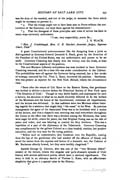
[p. 233]
was the duty of the marshal, and not of the judge, to summon the force which might be necessary to prevent it:
"4. That the troops ought not to have been sent to Provo without the concurrence of the Governor, nor kept there against his remonstrance:
"5. That the disregard of these principles and rules of action has been in many ways extremely unfortunate.
"I am, very respectfully, yours, &c,
J. S. BLACK.
"Hon. J. Cradlebaugh, Hon. C. E. Sinclair, Associate Judges, Supreme Court, Utah."
A great Constitutional pronouncement like the foregoing from a jurist so distinguished as Attorney-General Jeremiah S. Black, given by the direction of the President of the United States, was too authoritative and potent to be set aside. Governor Cumming had clearly won the victory over his rivals, at least in the Constitutional aspects of his position.
The anti-Mormon influence everywhere was now invoked to have Governor Cumming removed, and for a time this was under consideration in the Cabinet. The probabilities were all against the Governor being retained, but a fine stroke of strategy, executed by Col. Thos. L. Kane, recovered his position. Stenhouse, who was present as reporter for the New York Herald, relates the circumstance thus:
"Soon after the return of Col. Kane to the Eastern States, that gentleman was invited to deliver a lecture before the Historical Society of New York upon 'The Situation of Utah.' Though in very feeble health, and unprepared for such a lecture, his devotion to what he no doubt sincerely believed to be the welfare of the Mormons and the honor of the Government, overcame all impediments, and the lecture was delivered. In that audience were two Mormon elders listening eagerly for a sentence that might help "the cause" in the West. By previous arrangement the agent of the Associated Press was to be furnished with a notice of the lecture, and thus a dispatch next morning was read everywhere throughout the Union to the effect that there was a division among the Mormons, that some were eager for strife, others for peace, but that Brigham Young was on the side of peace and order, and was laboring to control his fiery brethren. This was a repetition of a part of the diplomacy of the Tabernacle. Governor Cumming was complimented by the gallant Colonel as a clear-headed, resolute, but prudent executive, and the very man for the trying position.
"Before such an endorsement, sent broadcast over the Republic, coming from the lips of the gentleman who had warded off the effusion of blood, and saved the nation from the expense and horror of a domestic war, the Cabinet of Mr. Buchanan silently bowed, but they were terribly chagrined."
Apostle George Q. Cannon, who was one of the "two Mormon elders" present at the lecture, relates this singular and quite dramatic episode of Utah history with several additional points, which have a national significance. The story is told in an obituary sketch of Thomas L. Kane, with an affectionate simplicity that gives it a special value in the History:

[p. 234]
"As I write, another illustration of his forgetfulness of self and his ardent zeal in behalf of Utah comes to my mind. It was during the Buchanan administration. Governor Cumming, who had been sent out by President Buchanan with the army as Governor of the Territory, did not work harmoniously with the army officers. Differences had arisen between them at the time they were in camp during the winter at Ham's Fork and Fort Bridger.
"These differences increased after they came into the valley, and the influence of the army people was used with the administration to have Cumming removed. President Buchanan was inclined to yield to the pressure of Albert Sidney Johnston's friends. Johnston at that time was quite an influential personage; in fact influences were being used to prepare the way for him to succeed General Winfield Scott as commander of the army of the United States. President Buchanan made inquiries of some of General Kane's friends as to how the removal of Governor Cumming would be received by him. He heard of this, and, though at the time confined to his room with an attack of pleurisy, saw that something must be done to prevent the removal of Governor Cumming, which he viewed at the time as a move that would be unfortunate to Utah. The Historical Society of New York City—a very influential society—had solicited him to deliver a lecture upon Utah affairs; but he had postponed accepting the offer. He saw that this was the opportune moment to deliver it, and though suffering from severe pain he resolved to go to New York and deliver the lecture. His friends tried to dissuade him from the step, as they felt that he was endangering his life. But he was determined to go, and wrote to the President of the Society, who was pleased to accept the proffer of the lecture. Accompanied by his physician, he traveled from Philadelphia to New York, delivered the lecture, in which he eulogized Governor Cumming, and gave him the praise that was due to him for his conduct after reaching Utah, and the next morning there appeared in all the newspapers of the country, through the associated press, a brief epitome of the lecture, commending Governor Cumming's administration of affairs. It had the effect to turn the scale in Cumming's favor. President Buchanan relinquished the idea of removing him, and he remained Governor until he had served out his full term. I was in the East at the time and familiar with all the circumstances, and I was deeply impressed with the General's conduct on that occasion."
There is to be discerned in these two statements a division growing up in the views and purposes of the members of Buchanan's Cabinet at that critical juncture of our national affairs, which is capitally presented in Mr. Blaine's great book of reminiscences, in which he presents, on the one side, John B. Floyd, Secretary of War with President Buchanan preparing the way for secession; on the other, Gen. Lewis Cass, Secretary of State, and Attorney-General Jeremiah S. Black, taking the alarm both for the Democracy and the Union, and setting their faces against the secession movement, which General Albert Sidney Johnston was fated to represent as one of its chiefest military captains. Mr. Blaine has not intended any reference to Utah, but that which he describes touching a division in the Cabinet, relative to our national affairs, is strangely to be traced at the same moment in the Cabinet over Utah affairs. So far as secession and Secretary Floyd is concerned, the statement of ex-Delegate Cannon suggests a very striking
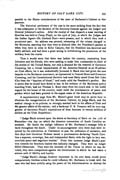
[p. 235]
parallel to the Blaine reminiscences of the state of Buchanan's Cabinet at that juncture.
The historical pertinence of the case is the more striking from the fact that it was subsequent to the decision of the Attorney-General against the Judges' and General Johnston's action. After the receipt of that dispatch a mass meeting of Gentiles was held at Camp Floyd, on the 23rd of July, at which the Judges and the Indian Agent—Dr. Garland Hurt—were present, and in which they took a prominent part. An address was penned, rehearsing all the crimes charged to the Mormons, asserting that they were as disloyal after the the President's pardon as when they were in arms in Echo Canyon, that the President was deceived and badly advised, and had done a great wrong in withdrawing the protection of the military from the courts.
Thus it would seem that there was before the country, emanating from Johnston and his friends, who were seeking to make him commander-in-chief of the armies of the United States, not only a demand for the removal of Governor Cumming, but a virtual impeachment of the Attorney-General as an ill-adviser on Utah affairs, for it was undoubtedly Jeremiah S. Black who had given the new impulse to the Buchanan movement, as represented in General Kane and Governor Cumming, and his Constitutional decision had most likely saved Great Salt Lake City from the "baptism of blood," and made valid the President's pardon. But it seems that he would have failed at last, in his revision of the Buchanan policy touching Utah, had not Thomas L. Kane risen from his couch and, in his noble regard for the honor of his country, made valid the proclamation of peace and pardon which had been granted in the august name of the American Republic.
A supplementary page from Mr. Blaine's great book may be given here to illustrate the reorganization of the Buchanan Cabinet, by Judge Black, and the radical change in its policies, so strongly marked both in the affairs of Utah and the greater affairs of the nation; and a bankrupt U. S. Treasury will be very suggestive of Secretary Floyd's expenditure of from fourteen to twenty millions of dollars on the Utah Expedition:
"Judge Black entered upon his duties as Secretary of State on the 17th of December—the day on which the disunion convention of South Carolina assembled. He found the malign influence of Mr. Buchanan's message fully at work throughout the South. Under its encouragement only three days were required by the convention at Charleston to pass the ordinance of secession, and four days later Governor Pickens issued a proclamation declaring 'South Carolina a separate, sovereign, free and independent State, with the right to levy war, conclude peace and negotiate treaties.' From that moment Judge Black's position towards the Southern leaders was radically changed. They were no longer fellow-Democrats. They were the enemies of the Union to which he was devoted, they were conspirators against the Government to which he had taken a selemn oath of fidelity and loyalty.
"Judge Black's change, however important to his own fame, would prove comparatively fruitless unless he could influence Mr. Buchanan to break with the men who had been artfully using the power of his Administration to destroy the
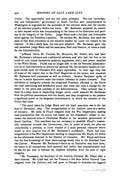
[p. 236]
Union. The opportunity and the test came promptly. The new 'sovereign, free and independent' government of South Carolina sent commissioners to Washington to negotiate for the surrender of the national forts and the transfer of the national property within her limits. Mr. Buchanan prepared an answer to their request which was compromising to the honor of the Executive and perilous to the integrity of the Union. Judge Black took a decided and irrevocable stand against the President's position. He advised Mr. Buchanan that upon the basis of that fatal concession to the disunion leaders he could not remain in his Cabinet. It was a sharp issue, but was soon adjusted. Mr. Buchanan gave way and permitted Judge Black and his associates, Holt and Stanton, to frame a reply for the Administration.
"Jefferson Davis, Mr. Toombs, Mr. Benjamin, Mr. Slidell, who had been Mr. Buchanan's intimate and confidential advisers, and who had led him to the brink of ruin, found themselves suddenly supplanted, and a new power installed in the White House. Foiled and no longer able to use the National Administration as an instrumentality to destroy the national life, the secession leaders in Congress turned upon the President with angry reproaches. In their rage they lost all sense of the respect due to the Chief Magistrate of the nation, and assaulted Mr. Buchanan with coarseness as well as violence. Senator Benjamin spoke of him as 'a senile Executive under the sinister influence of insane counsels.' This exhibition of malignity towards the misguided President afforded to the North the most convincing and satisfactory proof that there had been a change for the better in the plans and purposes of the Administration. They realized that it must be a deep sense of impending danger which could separate Mr. Buchanan from his political associations with the South, and they recognized in his position a significant proof of the desperate determination to which the enemies of the Union had come.
"The stand taken by Judge Black and his loyal associates was in the last days of December, i860. The reorganization of the Cabinet came as a matter of necessity. Mr. John B. Floyd resigned from the War Department, making loud proclamation that his action was based on the President's refusal to surrender the national forts in Charleston Harbor to the secession government of South Carolina. This manifesto was not necessary to establish Floyd's treasonable intentions towards the Government; but, in point of truth, the plea was undoubtedly a pretense, to cover reasons of a more personal character which would at once deprive him of Mr. Buchanan's confidence. There had been irregularities in the War Department tending to compromise Mr. Floyd, for which he was afterwards indicted in the District of Columbia. Mr. Floyd well knew that the first knowledge of these shortcomings would lead to his dismissal from the Cabinet. Whatever Mr. Buchanan's faults as an Executive may have been, his honor in all transactions, both personal and public, was unquestionable, and he was the last man to tolerate the slightest deviation from the path of rigid integrity.
"Mr. Thompson, the Secretary of the Interior, followed Mr. Floyd after a short interval. Mr. Cobb had left the Treasury a few days before General Cass resigned from the Cabinet, and had gone to Georgia to stimulate her laggard
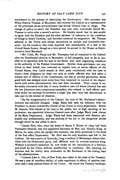
[p. 237]
movements in the scheme of destroying the Government. His successor was Philip Francis Thomas, of Maryland, who entered the Cabinet as a representative of the principles whose announcement had forced General Cass to resign. The change of policy to which the President was now fully committed forced Mr. Thomas to retire after a month's service. He frankly stated that he was unable to agree with the President and his other advisers 'in reference to the condition of things in South Carolina,' and therefore tendered his resignation. Mr. Thomas adhered to the Union and always maintained an upright and honorable character; but his course at that crisis deprived him subsequently of a seat in the United States Senate, though at a later period he served in the House as Representative from Maryland.
"Mr. Cobb, Mr. Floyd and Mr. Thompson had all remained in the Cabinet after the Presidential election in November, in full sympathy, and so far as possible in co-operation with the men in the South who were organizing resistance to the authority of the Federal Government. Neither those gentlemen, nor any friend in their behalf, ever ventured to explain how, as sworn officers of the United States, they could remain at their posts consistently with the laws of honor—laws obligatory on them not only as public officials who had taken a solemn oath of fidelity to the Constitution, but also as private gentlemen, whose good faith was pledged anew every hour they remained in control of the departments with whose administration they had been intrusted. Their course is unfavorably contrasted with that of many Southern men (of whom General Lee and the two Johnstons were conspicuous examples), who refused to hold official positions under the national Government a single day after they had determined to take part in the scheme of disunion.
"By the reorganization of the Cabinet the tone of Mr. Buchanan's administration was radically changed. Judge Black had used his influence with the President to secure trustworthy friends of the Union in every department. Edwin M. Stanton, little known at the time to the public, but of high standing in his profession, was appointed Attorney-General soon after Judge Black took charge of the State Department. Judge Black had been associated with Stanton personally and professionally, and was desirous of his aid in the dangerous period through which he was called to serve.
"Joseph Holt, who, since the death of Aaron V. Brown in 1859, had been Postmaster-General, was now appointed Secretary of War, and Horatio King, of Maine, for many years the upright first assistant, was justly promoted to the head of the Post-office Department. Mr. Holt was the only Southern man left in the Cabinet. He was a native of Kentucky, long a resident of Mississippi, always identified with the Democratic party, and affiliated with its extreme southern wing. Without a moment's hesitation he now broke all the associations of a lifetime and stood by the Union without qualification or condition. His learning, his firmness and his ability were invaluable to Mr. Buchanan in the closing days of his administration.
"General John A. Dix, of New York, was called to the head of the Treasury. He was a man of excellent ability, of wide experience in affairs, of spotless character and a most zealous friend of the Union. He found the Treasury bankrupt,
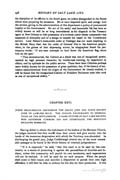
[p. 238]
the discipline of its officers in the South gone, its orders disregarded in the States which were preparing for secession. He at once imparted spirit and energy into the service, giving to the administration of this department a policy of pronounced loyalty to the Government. No act of his useful and honorable life has been so widely known or will be so long remembered as his dispatch to the Treasury agent at New Orleans to take possession of a revenue cutter whose commander was suspected of disloyalty and of a design to transfer his vessel to the Confederate service. Lord Nelson's memorable order at Trafalgar was not more inspiring to the British Navy than was the order of General Dix to the American people, when, in the gloom of that depressing winter, he telegraphed South his peremptory words: 'If any man attempts to haul down the American flag, shoot him on the spot.'
"Thus reconstructed, the Cabinet as a whole was one of recognized power, marked by high personal character, by intellectual training, by experience in affairs, and by aptitude for the public service. There have been Cabinets perhaps more widely known for the possession of great qualities; but, if the history of successive administrations from the origin of the Government be closely studied, it will be found that the reorganised Cabinet of President Buchanan must take rank as one of exceptional ability."
CHAPTER XXVI.
JUDGE CRADLEBAUGH DISCHARGES THE GRAND JURY AND TURNS SOCIETY OVER TO LAWLESS RULE. THE INDIANS ENCOURAGED TO DEPREDATIONS ON THE SETTLEMENTS. A DARK PICTURE OF SALT LAKE SOCIETY. WHY GOVERNOR CUMMING DID NOT INVESTIGATE THE MOUNTAIN MEADOWS MASSACRE.
Having failed to obtain the indictment of the leaders of the Mormon Church, the judges resolved that they would close their courts and give society into the hands of the numerous desperadoes with which the Territory now abounded. In discharging the grand jury, Judge Cradlebaugh uttered one of the most remarkable passages to be found in the whole history of criminal jurisprudence:
"If it is expected," he said, "that this court is to be used by this community as a means of protecting it against the peccadilloes of Gentiles and Indians, unless this community will punish its own murderers, such expectations will not be realized. It will be used for no such purpose. When the people shall come to their reason and manifest a disposition to punish their own high offenders, it will then be time to enforce the law also for their protection. If this
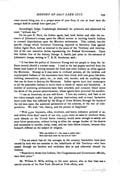
[p. 239]
court cannot bring you to a proper sense of your duty, it can at least turn the savages held in custody loose upon you."
Accordingly Judge Cradlebaugh dismissed the prisoners and adjourned his court "without day."
On his part D. Hurt, the Indian agent, had, both before and after the entrance of Johnston's troops, spent his official service in inciting hostile Indians to commit depredations upon the Mormon settlements. This, indeed, was the specific charge which Governor Cumming reported to Secretary Cass against Indian Agent Hurt, both as inimical to the peace of the Territory and interruptive of his own executive duties representing the Federal Government. Upon this Indian line of the history, George A. Smith, just prior to the entrance of Johnston's troops, writing to T. B. H. Stenhouse, said:
"It has been the policy of Governor Young and our people to keep the Indians neutral, should a contest ensue. I read in the last papers received from the States loud boasts of having secured the Utah and other Indians as allies against the Mormons. Strange as it may seem to civilized persons, all the reckless and unprincipled Indians of the mountains have been hired, with new guns, blankets, clothing, ammunition, paint, etc., to steal, rob, murder, and do anything else that can be done to destroy the Mormons. Indian agents have sent messengers to all the peaceable Indians to incite them to deeds of rapine and bloodshed. A number of scattering settlements have been attacked, and innocent blood stains the skirts of the present administration, whose agents have procured the murders.
"I am an American, as you well know. I love my country, and hate to see her rulers trample under foot her glorious institutions, and re-enact barbarism more cruel than that inflicted by the King of Great Britain, through the hands of the red men upon the scattered settlements of the colonies, in the war of independence. We wish 'life, liberty, and the pursuit of happiness.'
"With 3,500 bayonets, rifles, revolvers, and heavy ordnance pointed at us, and within three days' march of our city, 4,500 more en route to reinforce them, carte blanche on the United States treasury, would seem enough to satisfy our most bitter persecutors, without hiring as allies the savage hordes of the deserts and mountains to murder, scalp, roast, and eat their fellow-citizens, because they forsooth differed on the subject of religion.
'Who can believe it!—the cause is rather odd— Men hate each other for the love of God!'"You are aware that all the outrages in the country, heretofore, have been caused by men who are enemies to the inhabitants of this Territory—who have passed through our borders and recklessly shot at and otherwise abused the Indians.
"Experience shows that Indians, like Congressmen and Government officials, have their price."
Mr. William G. Mills, writing to the same person, who at that time was a special attache of the New York Herald on Utah affairs, said:
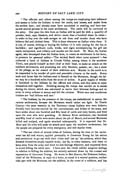
[p. 240]
"The officials and others among the troops are employing their influence and means to bribe the Indians to steal the cattle, and horses, and mules from the settlers here; and already some have succeeded in stealing, and have massacred several persons in the outer settlements. The cattle will be conveyed to the army. One poor fox skin from an Indian will be paid for with a quantity of powder, lead, caps, blankets, and shirts—more than a hundred times its value— in order to buy over the rude savages to rob from and murder those who have hitherto fed and clothed them. This is done whenever an Indian visits them. It is not, of course, bribing or buying the Indian—it is only paying for the fox or buckskin; and significant nods, winks, and signs accompanying the gift are easily interpreted, and robbery and murder are the result. Dr. Hurt, the Indian agent, who decamped from the Indian farm, to create an excitement in his favor, in pretence for personal safety—'The wicked fleeth when none pursueth'—has collected a band of Indians in Uintah Valley, among whom is the murderer Tintic, and placed himself as their chief at their head, to make an attack on the southern settlements, and promising not only blankets, powder, etc., but a share of the pillage, as the reward of their nefarious acts. Murder in the north is to be responded to by murder of quiet and peaceable citizens in the south. Every mule and horse that the Indians steal is blamed on the Mormons, though the latter may be a hundred miles from the scene of action. A good supply of whisky is furnished to the Indians by the officers and others, and they seem to enjoy themselves well together. Drinking among the troops was carried on to excess during the winter, which was calculated to excite their bitterest feelings and to enter in every scheme to annoy and kill the citizens. White men and murderous Indians are 'hail fellows well met.'
"The Indians, by the presence of the troops, are emboldened to annoy the various settlements, because the Mormons would rather not fight. In Tooele County—the most westerly in the Territory—those Indians who were hitherto friendly have become excited by the conversations and bribes of the army, and have stolen about one hundred and fifty head of cattle and sixty horses, and fired upon the men who were guarding. At Salmon River settlement, two hundred and fifty head of cattle were stolen about the 4th of March, and several Mormons killed and scalped, and again attacked subsequently. It is expected that Dr. Hurt and his tribe will make an attack soon upon the southern settlements; but the people are prepared for every emergency, and will repulse them.
"The war chiefs of several tribes of Indians, during the time of the excitement last fall and winter, applied personally to Governor Young for his advice and permission to go out with their tribes and 'use up' the soldiers, which they deemed themselves amply capable to do; but he, in every instance, told them to keep away from the army and show no bad feelings whatever, and requested them to avoid killing the white men. I have seen the chiefs exhibit sanguine feelings in relation to killing the soldiers, but entirely softened down by the counsel and expressions of Governor Young. He wrote to Ben Simons, the Delaware Indian, chief of the Weberites, in reply to a letter, to stand in a neutral position, neither take part with the Mormons nor the soldiers, in the event of a collision, and has
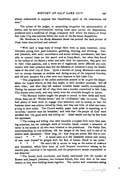
[p. 241]
always endeavored to suppress that bloodthirsty spirit of the treacherous red men."
The action of the judges, in suspending altogether the administration of justice, and by semi-proclamation turning loose upon society the desperadoes, produced such a condition of things, compared with which the history of Great Salt Lake City was stainless before the onset of the Buchanan Expedition.
Mr. Stenhouse in his Rocky Mountain Saints has painted the dark picture of those times thus outlined and colored:
"With such a large body of troops there were, as usual, numerous camp-followers plying their petit industries, gambling, thieving, and drinking. General Johnston, with strict surveillance and severe military punishment, had been able to control them on the march and at Camp Scott; but when they found in the valleys of the Saints a wider and safer field for operations, they gave rein to their vilest passions, and a worse set of vagabonds never afflicted any community with their presence than did the followers of Johnston's army the inhabitants of the chief city of Zion. Quite a number of young Mormons—and some not-so young—became as reckless and daring as any of the imported Gentiles, and life and property for a time were very insecure in Salt Lake City.
"The programme of the police authorities seemed to be to give the desperadoes the largest liberty, so that they might, in their drunken carousals, 'kill off each other,' and what they left undone invisible hands readily accomplished. During the summer and fall of 1859 there was a murder committed in Salt Lake City almost every week, and very rarely were the criminals brought to justice.
"The Mormon leaders taught the people to attend to their fields and workshops, keep out of 'Whisky Street,' and let 'civilisation' take its course. They had plenty of hard work to engage their attention, and no money, so that the business street was seldom visited by them, and they saw little of what was transpiring in their midst. The Church weekly paper took pride in reporting, as it occurred, 'another man for breakfast,' and with that' the people of God' were satisfied that 'the good work was rolling on.' Israel would one day be free from his oppressors.
"The rioting and killing that were traceable occupied little more than passing attention, but the midnight work of invisible hands created a sensation of terror in the minds of all who were inimical to the priesthood. The Valley Tan, notwithstanding its true boldness, felt the danger of the hour, and in one of its doleful wails ejaculated: 'How long, oh! how long are scenes like this to continue? * * * It would seem as if the insatiable demon and enemy of man must himself be gorged with the flow of human blood in our midst.'
* * * 'No man's life is secure as long as the scenes of violence and bloodshed, which have been of such frequent occurrence among us for months past, continue to be repeated, and the perpetrators escape unpunished or not detected.'
"The bloody work continued, and finally terminated with the murder of Brewer and Joaquin Johnston, two intimate friends, who were shot at the same instant as they were walking home together. The author well remembers seeing
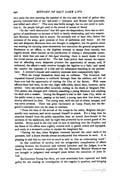
[p. 242]
very early the next morning the marshal of the city and the chief of police who gravely informed him of the 'sad news'—'Johnston and Brewer had quarreled, and killed each other!' This story was feeble enough, but no one cared to question it: the people had got used to the record of scenes of blood.
"In the 'swift destruction' that fell upon the desperadoes, there was no mitigation of punishment on account of faith or family relationship, and very respectable Mormon families had to mourn the untimely end of boys who, before the entrance of the army, gave promise of lives of usefulness and honor. All the bad and desperate Mormons were not brought to judgment, but the pretext alone was wanting for carrying more extensively into execution the general programme. Resistance to an officer, or the slightest attempt to escape from custody, was eagerly seized, when wanted, as the justification of closing a disreputable career, and in more than one case of this legal shooting, there is much doubt if even the trivial excuse was waited for. The Salt Lake police then earned the reputation of affording every desperate prisoner the opportunity of escape, and, if embraced, the officer's ready revolver brought the fugitive to a 'halt,' and saved the country the expenses of a trial and his subsequent boarding in the penitentiary. A coroner's inquest and cemetery expenses were comparatively light.
"With the troops themselves there was no collision. The Governor had requested General Johnston to withhold furlough from the soldiers, and few of them ever had the opportunity of visiting the City of the Saints. With some officers there had been, in the city, slight difficulties, which were, however, easily settled. Only one serious affair occurred, ending in the death of Sergeant Pike. This person was charged with violently assaulting a young Mormon and cracking his skull with a musket. During the Sergeant's trial in Salt Lake City, while on the public street at noon, passing to his hotel, a young man shot him down, and shortly afterward lie died. The young man, with the aid of others, escaped, and was never arrested. There was great excitement at Camp Floyd, but the Sergeant's comrades were too far away to retaliate.
"From the time of the arrival of the troops in the valley, Brigham was personally very cautious, and never exposed himself to attack. For a long time he absented himself from the public assemblies, kept an armed door-keeper at the entrance of his residences, and by night was protected by an armed guard of the faithful. Every ward in the city took its turn in watching over the Prophet, and the floors of his offices were nightly covered with a guard, armed and equipped, and ready at a moment's notice to repulse the imaginary foe.
"During the day, when Brigham ventured beyond the outer walls of his premises, half a dozen friends always accompanied him wherever he went. It is pleasing to add that no one ever so much as said to him an unbecoming word."
In this condition of society, and the antagonistic complication of affairs existing between the Governor and General Johnston and the Judges, is to be found the exact historical exposition why the Mountain Meadow Massacre was not brought to judgment and avenged years before the execution of John D. Lee.
Ex-Governor Young has often, yet most senselessly been reproved and held guilty for not causing an investigation of the tragedy in question, and bringing
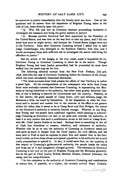
[p. 243]
its executors to justice immediately after the bloody deed was done. One of the questions and its answer from the deposition of Brigham Young, taken at the trial of Lee, bears directly upon this point:
"Q. Why did you not as Governor institute proceedings forthwith to investigate the massacre and bring the guilty authors to justice?
"A. Because another Governor had been appointed by the President of the United States, and was then on the way here to take my place, and I did not know how soon he might arrive; and because the United States Judges were not in the Territory. Soon after Governor Cumming arrived I asked him to take Judge Cradlebaugh, who belonged to the Southern District, with him, and I would accompany them with sufficient aid to investigate the matter and bring the offenders to justice."
But the action of the Judges, at the very onset, made it impossible for ex-Governor Young or Governor Cumming to move far in the matter. Though Brigham Young had been Justice personified, had he proceeded he must have walked into the death-trap set for him.
The following editorial excerpt from the New York Tribune, July 3rd, 1858, describes the case of Governor Cumming before the entrance of the troops, which was more abundantly illustrated afterwards:
"The latest accounts from Utah present the affairs of that Territory in rather a queer light. All the correspondents of the newspapers who write from Camp Scott most zealously contend that Governor Cumming, in representing the Mormons as having submitted to his authority, has either been grossly deceived himself, or else is seeking to deceive the Government and the country. Possibly, as to this matter, the good people of Camp Scott, civil and military, judge the Mormons a little too much by themselves. If the disposition to obey the Governor and to second and sustain him in the exercise of his office is not greater within the valley than it seems to be at Camp Scott and Fort Bridger, the extent of the Governor's authority is certainly limited enough. Whether or not Brigham Young and his people have combined together, while seeming to acknowledge Cumming as Governor—in fact to set aside and override his authority, at least it is very certain that such a combination exists in full force at Camp Scott, with Mr. Chief Justice Eckles at its head. Perhaps there is something in the air of Utah that stimulates to treason, rebellion, and resistance to authority. Whether that be so or not, the authority of Cumming as Governor seems just now quite as much in danger from the Chief Justice, the civil officers, and the army sent to Utah at such an expense to place him and sustain him in the Governor's chair, as from those whose anticipated opposition to his authority led to such costly preparations to uphold it. In fact, it would seem that, on the question of due respect to Cumming's gubernatorial authority, the people inside the valley and those out of it had completely changed ground. The resistance to Governor Cumming is not now on the part of Brigham Young and the Mormons generally, but on the part of Chief Justice Eckels, Marshal Dotson, General Johnston, the camp, and the camp-followers.
"In this resistance to the authority of Governor Cumming and combination to reduce him, if possible, to a cipher, the recently arrived Peace Commis-
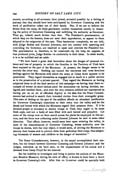
[p. 244]
sioners, according to all accounts, have joined, actuated possibly by a feeling of jealousy that they should have been anticipated by Governor Cumming and the work of pacification taken out of their hands. Nor, if we are to believe the letters from the camp, do these gentlemen confine themselves merely to thwarting the policy of Governor Cumming and nullifying his authority as Governor. They go, indeed, much further than that. The President's proclamation, of which they are the bearers, does not meet their approbation, or appear to them adapted to the exigencies of the case. They harmonize completely, we are told, with Judge Eckles and General Johnston, and not content with upsetting and overriding the Governor, are resolved to upset and override the President too. The proclamation is, therefore, to be construed—by the help, we suppose, of that profound jurist, Judge Eckles—in conformity to their ideas. In other words, it is to be nullified and set aside.
"We have heard a great deal heretofore about the danger of personal violence and loss of property to which the Gentiles in the Territory of Utah have been exposed on the part of the Mormons. At present, the danger seems to be entirely the other way. Nothing can exceed the rancorous and even ferocious feelings against the Mormons with which the army at Camp Scott appears to be penetrated. They regard themselves as engaged not so much in a public service as in the prosecution of a private quarrel. They regard the Mormons as having subjected them to all the hard service of this campaign—as having kept them encamped all winter on short rations amid the mountains—as having derided, maligned, and insulted them; and even the very common soldiers are represented as having put on an air of offended dignity at the idea that the Peace Commissioners had arrived to snatch their intended victims from their revengeful grasp. This state of feeling on the part of the soldiers affords an abundant justification for Governor Cumming's objections to their entry into the valley and for the dread and horror with which, the Mormons regard their presence there. If it be deemed proper or necessary to station troops in Utah, they ought to be some fresh corps, and not a body of men filled with such hatred and prejudice. Let some of the troops now on their march across the plains be employed in this service, and the force now collecting under General Johnson be sent in some other direction. That officer, however, would seem bent upon entering the valley, in spite of the remonstrances of Governor Cumming, whose authority over the troops he denies, with the very object, it would seem, of driving the Mormons to destroy their houses and to prevent them from gathering: their crops, thus subjecting thousands of women and children to the danger of starvation."
The Peace Commissioners, however, in the sequel accomplished their mission, but the breach between Governor Cumming and General Johnston and the Judges, extended, as we have seen, to the impeachment of his course and a demand from Camp Floyd for his removal.
But his inability to investigate and bring to justice the authors of the Mountain Meadow Massacre, during his term of office, is known to have been a thorn in Governor Cumming's side. After him no Governor could be specially held
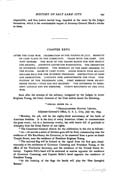
[p. 245]
responsible; and thus justice tarried long, impeded at the onset by the Judges themselves, which is the unmistakable import of Attorney-General Black's rebuke to them.